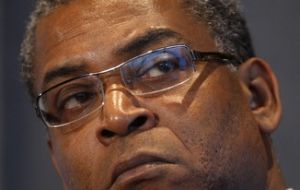MercoPress. South Atlantic News Agency
Haiti’s aid and reconstruction plan main challenge: a legacy of failures
 Haitian Prime Minister Jean-Max Bellerive admitted candidly that Haiti so far has been a “failed” state
Haitian Prime Minister Jean-Max Bellerive admitted candidly that Haiti so far has been a “failed” state Canadian Prime Minister Stephen Harper speaking at the International Conference on Haiti taking place in Montreal conceded Monday that countries are in for a decade of “hard work” to rebuild earthquake-shattered Haiti.
“It’s not an exaggeration to say that 10 years of hard work awaits the world in Haiti,” Harper said at the international meeting convened to set the stage for Haiti’s long reconstruction process.
Harper praised governments’ swift response to the January 12 calamity, which levelled much of Port au Prince, the capital, and neighbouring cities, and might have killed up to 200,000, according to recent estimates.
The Montreal conference brings together foreign ministers from more than a dozen countries, including US Secretary of State Hillary Clinton, along with international bodies such as the United Nations and the World Bank, and a host of non-governmental organizations, which are urging states to take such actions as forgiving Haiti of its debt burden.
The conference intends to outline how to approach reconstruction, which Haitian Prime Minister Jean-Max Bellerive said is an opportunity to manoeuvre Haiti from a state that continues to fail, to one that finally succeeds.
PM Bellerive did not mince words to admit that the long history of aid and reconstruction efforts have not yielded enough in the way of progress.
“Where is the bottleneck there?” he asked. He quickly identified three actions that have contributed to this legacy and to the level of paralysis in the face of disaster.
For one, the battered Haitian government structure cannot efficiently coordinate with its international partners and thus respond to the emergency; it will set up specific crisis committees to this end.
Also, Haiti’s fragile economy is excessively centralized in Port au Prince, Bellerive said. “In 30 seconds Haiti lost 60 per cent of its GDP.” Decentralization, he declared is key. And finally Haiti’s large diaspora abroad must also organize to assist in rebuilding Haiti’s society.
Bellerive admitted that the government’s geological experts had warned of such earthquakes. “But the resolution of social and other conflicts,” he said, “did not give us time to mitigate the catastrophes of such an event.”
Bellerive mentioned the urgent need for 200,000 tents to house Haiti’s homeless. He said 400,000 families are living in a precarious state.
He also identified Haiti’s utter lack of orthopaedic and prosthetic services for the thousands who have lost limbs. And he warned of the coming rainy season and its effect on disease epidemic.
The Montreal conference precedes a larger conference in the weeks to come where actual aid dollars will be pledged.
Bellerive echoed Harper’s assertion his country will need long-term assistance. “I hope this assistance will not disappear quickly,” he said. “Haiti needs to improve itself and I call upon you to continue to help us”.
Back in Port-au-Prince Tourism Minister Patrick Delatour who was named to assess the quake’s damage and a reconstruction plan said that Haiti would need 3 billion US dollars. Two billion to build housing for the 200.000 people left homeless and the rest to rebuild the country’s infrastructure (including ministries and congress) plus upgrading the seaport and three international airports.
Washington has taken a frontline role in the disaster relief effort, sending in 20,000 troops as well as rescue teams and anchoring a hospital ship offshore to treat injured Haitians. But the US has also come under flak for its supervising role.
US Secretary of State Hillary Clinton sought to address those concerns: “The international community must ensure we are working in sync. Aid coordination has long been a challenge in Haiti, even before the earthquake,” Clinton said.
“We must find better mechanisms for coordination, oversight, and accountability to ensure that aid and investments are used effectively.”
Diplomats have raised the possibility of a kind of Marshall Plan for the island nation, similar to the US-led post-war reconstruction of Europe, which would take decades and require a huge commitment of resources and money.
Ministers and officials from the United Nations also discussed how to streamline delivery of food, water, drugs and medical supplies to people living in makeshift camps around the shattered capital of Port-au-Prince.
Foreign ministers and other officials from Brazil, Chile, France, Peru, Uruguay, Mexico, Costa Rica, the Dominican Republic, Japan and Spain were also present in Montreal for the talks. They were joined by officials from the European Union, the Organization of American States, the Inter-American Development Bank, the World Bank and the International Monetary Fund.




Top Comments
Disclaimer & comment rulesCommenting for this story is now closed.
If you have a Facebook account, become a fan and comment on our Facebook Page!